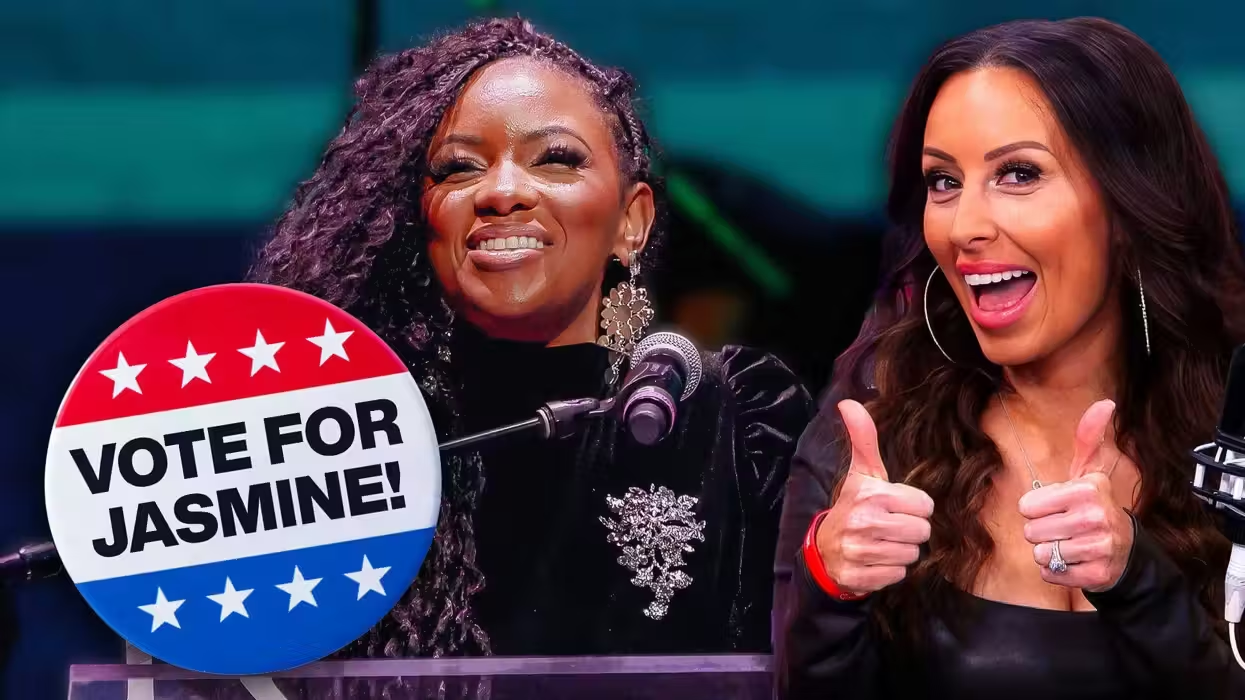
© 2025 Blaze Media LLC. All rights reserved.
How Much Has the Tea Party Infiltrated the GOP Convention? More Than You Might Think
August 28, 2012
"Almost everybody on there has been out front and supportive of the Tea Party."

Stay up-to-date on all the convention news by visiting TheBlaze's dedicated RNC page. Also find out how you can watch exclusive, live reports and analysis on TheBlaze TV. Get both here.
--
Today kicks off the 2012 Republican National Convention, inaugurating the final rush of what is likely to be one of the most contentious elections in American history.
This is a very different Republican National Convention than the one of four years ago, when infighting plagued the conservative base and the nominee conspicuously refused to speak the language of the party faithful. Now the GOP has thrown itself gleefully into the role of the morally righteous opposition. It is buoyed in that endeavor by a message that drove the largest shift in Congressional power since 1994 and a disciplined Presidential and Vice Presidential nominee.
And, of course, unlike the fractured base of 2008, this year's Republican National Convention now faces a base that is increasingly defined by its identification with the still insurgent Tea Party - a movement that has proven itself in state after state as a driving force for electoral success, if the GOP has the wherewithal to tap into it.
Which raises the $14 trillion question - will the GOP embrace the Tea Party at this year's convention?
The answer to this question is complex, and there is a decent amount of evidence both in regard to the RNC Platform and those invited to speakers' list that could support it, depending on how terms are defined. In providing evidence that could point to an answer, we decided to focus on several smaller questions that can provide evidence one way or another, while asking a few experts to weigh in with their opinions:
1) Who counts as a "Tea Party" leader, and what counts as a "Tea Party" inspired position?2) Have enough Tea Party leaders been tapped to speak at the convention?
3) Have enough Tea Party inspired positions been incorporated into the Republican platform?
You can watch the "Real News from The Blaze" crew preview the issue of the Tea Party at the convention below:
1. Who counts as a "Tea Party" leader, and what counts as a "Tea Party" inspired position?
Defining the Tea Party is tricky, as any pollster or media figure will tell you. Some media sources treat the group as functionally identical with the GOP's conservative base, albeit with a slightly more populist tone and much more conservative positions, both on social and economic issues. Certainly, some self-proclaimed Tea Party leaders, such as unsuccessful Presidential contender Rick Santorum, fit this mold.
But is the Tea Party really a down-the-line conservative group? Some movement experts say "no." Specifically, David Kirby and Emily Ekins of the Cato Institute have put out a 52 page report, as well as an op ed in Politico, suggesting that the Tea Party actually skews broadly libertarian, with a monomaniacal focus on economic issues and an ambivalence about social issues. From the op ed:
Conventional political wisdom for at least two decades has held that Republican primaries are won by emphasizing values issues to placate socially conservative voters. Observers point to Santorum’s strong showing in the presidential primaries. Exit polls, however, reveal Santorum never won a majority of the tea party vote in any primary.[...]Tea party supporters are actually united on economics, but split on social issues, we find, compiling data from local and national polls with dozens of original interviews with tea party members and leaders. Roughly half the tea party is socially conservative, half libertarian: fiscally conservative, but socially moderate to liberal.[...]
In fact, 91 percent of tea party libertarians are more concerned about taxes and jobs than gay marriage and abortion, according to a New York Times poll. Religious bona fides will not win the tea party vote in primaries. The tea party’s strong libertarian roots help explain why more and more Republican candidates are running as functional libertarians—emphasizing fiscal issues such as spending, tax reform and ending bailouts, while avoiding subjects like abortion and gay marriage—and winning.

In other words, as Ekins and Kirby put it, the Tea Party is more Rand Paul than Rick Santorum - a fitting comparison, given that both men are speaking at the Republican National Convention. So from the perspective of policy positions, figures like Paul can broadly be considered more "authentic" Tea Party leaders than can figures like Santorum, though both would incline more toward the Tea Party than outright establishment types like Arizona Senator John McCain.
However, there is another contour to Tea Party identification that goes beyond policy and speaks more to identity. This particular element was laid out by Myron Ebell, President of FreedomAction, who told the Blaze, "I think that the Tea Parties are really not about members of Congress who identify themselves with the Tea Party. There are some grassroots people who were instrumental in running state Tea Parties who ought to at least be recognized."
In other words, being a Tea Party leader isn't just about holding the correct positions, it's also about filling the right function. In this framing, Tea Partiers are either grassroots leaders themselves, or at the very least, are politicians whose candidacies were propelled by the grassroots more so than the establishment. In fact, many major Tea Party figures (such as Utah Sen. Mike Lee or Florida Sen. Marco Rubio) earned their bona fides by leveraging grassroots support against the establishment.
This grassroots orientation is in keeping with the anti-establishment nature of many of the politicians who predated the Tea Party, such as former Alaska Governor Sarah Palin. However, stylistically, the Tea Party is not entirely made up of Palins. Despite holding an overall populist orientation that is suspicious of self-designated cultural or intellectual elites, some Tea Partiers come from an elite legal background, such as Texas Senate nominee Ted Cruz, a graduate of Princeton and Harvard Law School, and the aforementioned Sen. Mike Lee, who clerked for Supreme Court Justice Samuel Alito. There is, however, an easy explanation for this discrepancy - namely, that despite being part of elite legal circles, Cruz and Lee share an overriding love of originalist legal theory, which argues for reading the Constitution as it was intended to be read by the Founding Fathers. This places them neatly in line with what hostile sources describe as the Tea Party's "radical constitutionalism."
Sal Russo, cofounder of the Tea Party Express, puts this in more positive terms. "The constitution is the Tea Party's lodestar," Russo told TheBlaze. "Some of the debate that we see today is 'should the government solve this problem or not solve this problem?' This is the fundamental point that the Federal Government should not be solving these problems...Every wrong doesn't have a government solution."
So broadly speaking, Tea Party leaders are either grassroots leaders or politicians drawn from the grassroots, whose overriding political concern is with constraining the government using a constitutionally-focused theory. From a policy perspective, Tea Party positions will tend to be libertarian and favor decentralization of issues, in line with that constitutionally-oriented theory.
2. Have enough Tea Party leaders been tapped to speak at the Republican National Convention?
Readers will have to make up their own mind about this question, as the evidence is mixed. Certainly, no grassroots Tea Party leaders have been selected to give speeches from the podium at the RNC, a fact which Myron Ebell mentioned as an argument against the group being fully accepted. However, in terms of the politicians involved, Sal Russo disagrees. In fact, based on polling of the Tea Party done by his organization, Mr. Russo claims that not only was the convention well-organized, but the nominees themselves were actually people who Tea Partiers have every reason to support.
"We started polling our members back in June. We got over 100,000 responses over the course of time. What we found was that the top three were kind of closely bunched. It changed sometimes when Bachmann had his spurt, or Perry had his spurt, or Gingrich had his spurt, but Mitt Romney was in the top three from the beginning," Russo said. "This idea that Romney is the antithesis of the Tea Party is just not true."
He added, "Once Romney was our nominee, we started polling the VP thing, and we had two favorites among our people. One of them was Marco Rubio and the other was Paul Ryan. So we have one of our top three for President, and one of our top two for Vice President."
And as for the speakers' lineup? Russo pointed out that its overriding feature was inclusion of new blood. "I thought, boy, just about every person is a Tea Party person from Nikki Haley to Rand Paul to Ted Cruz. Almost everybody on there has been out front and supportive of the Tea Party."
This sentiment has been echoed by Russ Walker, Vice President of Grassroots Campaigns, at Freedomworks. "Rand Paul is on there. Ted Cruz is on there. Mia Love is on there," Walker told TheBlaze. "Those are all great picks for us. They're all Tea Party people. We're, I think, generally pleased about the speakers' list so far."
The Tea Party figures represented on the RNC's convention speakers' list are among those widely considered to be its rising stars. South Carolina Governor Nikki Haley, Texas Senate nominee Ted Cruz, Florida Senator Marco Rubio, Kentucky Senator Rand Paul, South Carolina Congressman Tim Scott and Utah Congressional candidate Mia Love are all confirmed speakers, and almost to a man (or woman) are well-respected both within the Tea Party and within the GOP generally. In terms of speaker quality, the Tea Party arguably has quite an edge at the convention.
However, that's not to say that the convention is entirely Tea Party focused, nor that all wings of the insurgent movement have received the same amount of sunlight. The RNC's keynote speaker, Chris Christie, is well-regarded by some Tea Partiers for his blunt style, but generally considered too moderate ideologically to fit entirely in the Tea Party camp, suggesting that the GOP isn't quite ready to throw its full weight behind the new movement as a public face.
Moreover, there are more than a few Tea Party-influenced figures who have been outright ignored on the Speakers' list. First, there is Minnesota Rep. Michele Bachmann.
Bachmann is known by some as the “Queen of the Tea Party” (though liberals calls her the “Queen of Rage”). She is also credited by many people as one of the chief architects of the 2010 “Red Wave.” It stands to reason, therefore, that the GOP might want to invite her, if only for her ability to rouse a crowd.

But they didn't. Probably because Bachmann's recent accusations against Hillary Clinton staffer Huma Abedin have angered even her fellow Republicans, who see those accusations as undisciplined and intemperate, as well as a distraction from the wider cause of fighting terror. Bachmann has sworn up and down that she's being persecuted for "raising questions," but those may be questions the GOP doesn't want to consider in Tampa.
So who else has been excluded? Former Alaska governor Sarah Palin.
Palin announced last week that she won’t be speaking at the convention, adding that she’s “excited to hear from this year’s candidates.”
Yet Palin's announcement leaves out key details - for instance, whether she was invited to speak at all. Most press sources - even the Hollywood gossip sites - that have spoken to highly placed sources say she wasn't.
Ignoring these two women doesn't mean the GOP has ignored the Tea Party, but it does arguably signal that they are prepared to exclude the more populist, Midwestern "Mama Grizzly" variety of Tea Partier from the convention. More innocent explanations exist, but at least in the case of Palin, they are not particularly convincing, especially when you consider the aggressive push for Romney to choose an "anti-Palin" for his Vice Presidential nominee. However, reading tea leaves is a tricky business at the best of times, and there is no guarantee of any nefarious motivation regarding either Palin or Bachmann.
Moreover, Freedomworks doesn't see the exclusion of these two women as necessarily emblematic of a hostility to the Tea Party. Again, to quote Russ Walker: "I don't think it's hostile to the Tea Party at all. What I think they're trying to do is craft a message."
And as long as people like Rand Paul and Ted Cruz influence that message, Freedomworks is happy. Especially given their experience with the platform. Which, speaking of...
3. Have enough Tea Party inspired positions been incorporated into the Republican platform?
One measure of the growing influence of the Tea Party is the inclusion of nearly all of the recommendations from Freedomworks in the official Republican Party platform. From a Freedomworks press release:
The GOP’s official platform includes clear, specific language rejecting Cap and Trade, endorsing a strong Balanced Budget Amendment coupled with a two-thirds majority to raise taxes, and committing to an annual audit of the Federal Reserve as “the first step to achieving transparency.” The platform endorses full repeal of Obamacare and a solid list of patient-centered health care reforms including Health Savings Accounts interstate purchase of health insurance, and equalized tax treatment of group and individual insurance. Major reforms of Medicare and Medicaid are also included.The platform committee also included support for a “flatter” tax to the tax reform section, softening the Freedom Platform’s language calling for a completely Flat Tax. “Our online survey told us the grassroots want a single-rate tax system,” FreedomWorks Vice President Dean Clancy commented. “With the addition of the word ‘flatter,’ the GOP platform opens the door to a Flat Tax.”
The only element of the Freedom Platform not adopted was the proposal to “Eliminate the Department of Education.” Clancy explained: “We did not secure approval for ‘Eliminate the Department of Education’ – which, to be honest, was always the plank we regarded as most difficult to achieve. But the document’s education section does contain good language on the need for local control and a very strong endorsement of school choice, including vouchers. So we rate this section as a partial victory.”
According to Freedomworks, 11.5 of the original 12 planks they proposed were included. Russ Walker is even more ebullient about this result.
"We got everything completely the way we wanted it, exactly," Walker told theBlaze. "The RNC staff has been wonderful to work with. They opened their arms up to us when we went to work with them originally."
The lovefest doesn't stop there. Emily Ekins, the author of the study quoted above, told the Blaze that sources close to the Ron Paul campaign have expressed contentment with the platform over its inclusion of a plank to audit the Fed.
Granted, this doesn't mean the platform goes full libertarian. There are probably still planks supporting the drug war, for instance. There also was reportedly some infighting among the platform's writers over the question of how to handle same-sex marriage, and many pro-choice activists have expressed discontent over the platform's stance on abortion. However, seeing as all but one of these issues are hotly contested even within the libertarian movement, these planks are more likely to complement the platform's Tea Party-leaning slant than to contradict it.
Sal Russo of the Tea Party Express is also optimistic. "What I hear about the platform is it reflects the basis themes of the Tea Party," he said.
Want to leave a tip?
We answer to you. Help keep our content free of advertisers and big tech censorship by leaving a tip today.
Want to join the conversation?
Already a subscriber?
more stories
Sign up for the Blaze newsletter
By signing up, you agree to our Privacy Policy and Terms of Use, and agree to receive content that may sometimes include advertisements. You may opt out at any time.
Related Content
© 2025 Blaze Media LLC. All rights reserved.
Get the stories that matter most delivered directly to your inbox.
By signing up, you agree to our Privacy Policy and Terms of Use, and agree to receive content that may sometimes include advertisements. You may opt out at any time.






